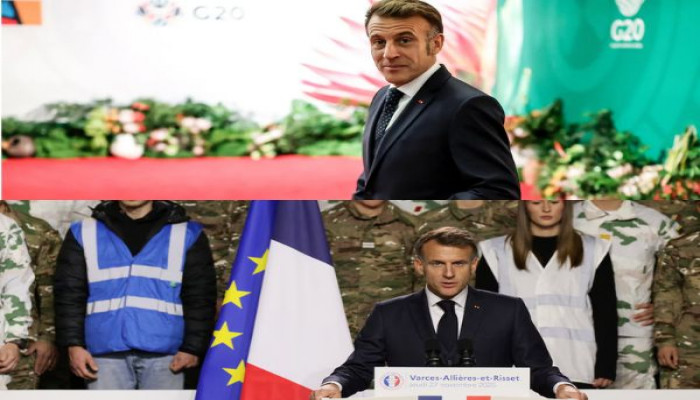France's Macron unveils voluntary military service amid 'accelerating threats'
- In Reports
- 08:34 PM, Nov 27, 2025
- Myind Staff
French President Emmanuel Macron is expected to share a new plan on Thursday on bringing back national military service. Earlier this week, during his visit to the 27th Mountain Infantry Brigade in the southeastern town of Varces, which is known as one of the most elite units in the country, the Élysée Palace said that Macron would make an announcement that would "reaffirm the importance of preparing the nation and its morale to face growing threats".
Sources quoted by several news organisations said that this statement was a clear sign of a new type of military service that would offer “serious” combat training but would only include volunteers.
The sources said France hopes to train between 2,000 and 3,000 volunteers in the first year and then increase the number up to 50,000 every year as the programme develops.
The announcement comes at a moment when Europe is facing a new and uncertain world, where the United States can no longer be fully relied on to stop the Russian threat to the continent.
Since the invasion of Ukraine and recent hybrid attacks on EU countries, some European officials have warned that Moscow could be ready to target a NATO member as early as 2028, which has caused anxiety across Europe.
There are rising concerns inside France as well, especially because the country has the second-largest army in the EU after Poland.
But many people may find the new push for mobilisation difficult to accept. France’s chief of defence staff, General Fabien Mandon, caused a strong reaction last week when he spoke about the need to strengthen the country’s ability to defend itself and said that France would have to show that it is ready "to lose its children".
Macron later told radio station RTL that the general’s words had been taken out of context. Still, the president stood by the main point and said that "if we want to protect ourselves […] we must demonstrate that we are not weak against the power that threatens us the most".
In another sign of growing concern, the government released a new crisis response guide this week called “Everyone Responsible” which gives advice on how to “prepare for a major crisis” including anything from external “aggressions” to natural disasters.
The guide, similar to efforts already seen in Germany, Poland and Sweden, says that “our society must adapt to become stronger” and asks French families to keep “emergency kits” with food, water, medicine and a battery-powered radio.
Military service has a long and deep history in France dating back to the Napoleonic era, and it still shapes the national identity, according to Guillaume Lasconjarias, an associate professor and military historian at the Sorbonne.
“From the French Revolution onwards, there is a very strong link between being a citizen and being a soldier. Military service was one of the pillars that helped build the Republic,” he said. This idea became formal in 1798 through the Jourdan Delbrel law, which stated that “every Frenchman is a soldier”.
“At the very beginning, conscription was literally a ‘blood tax’" on the people, Lasconjarias said. "It was the creation of an army that was ready to kill but also be killed,” he said, pointing to the huge losses in the Napoleonic campaigns and the two World Wars.
This period created what he described as the citizen soldier, and only a few people received exemptions.
Universal conscription for young men began in 1905 and lasted between two and three years until the end of the Algerian war in 1962, after which a long period of peace led to easier rules.
“This is when it became a ‘time tax’, the time a person had to invest in the army, whether they wanted to or not, Lasconjarias said.
Service was slowly reduced to 10 months in the 1990s and ended completely in 1997 under then-President Jacques Chirac.
Although military service was seen as an important step in life by many, it was not welcomed by all. In its last years, surveys showed that young people were “very critical” of compulsory service, while older groups were more supportive but still preferred lighter rules.
Even with this mixed history, Lasconjarias said he does not expect strong resistance to a new voluntary service.
“With a voluntary model, it would instead become a form of moral engagement,” he said.
He said that ending compulsory service created some distance between people and the army “because unless you have a soldier in the family, you do not know what happens in the army at all”, but the armed forces remain respected in France, especially among the young.
“In just about every poll, the armed forces rank among the most trusted and popular institutions,” he said.
After the 2015 attacks in Paris, many young French citizens rushed to join the army as reserves.
This, he said, shows that Macron’s plan has a strong chance of working. “Young French people still believe that serving their country means something.”







Comments